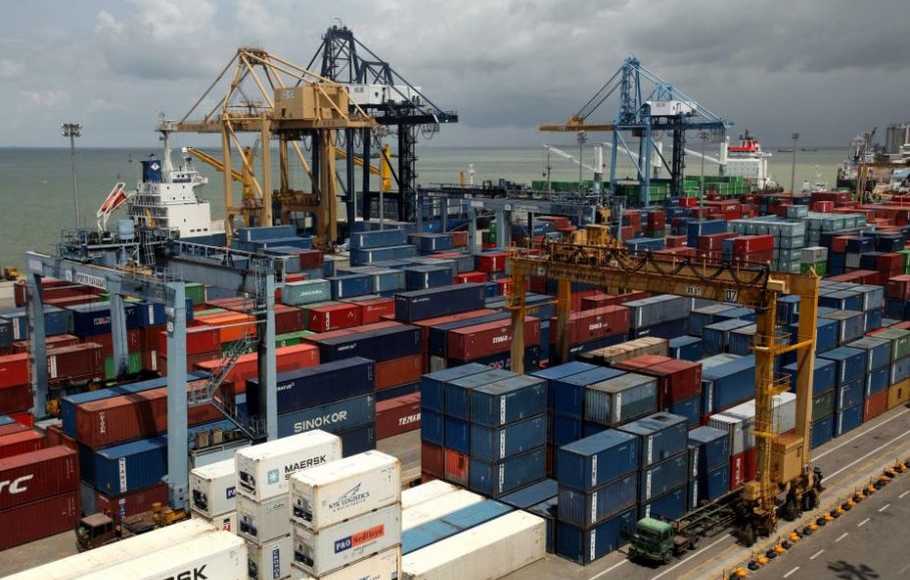UAE’s first-half non-oil foreign trade hits record $381bn on growing Cepa deals
Trade rose by 10 per cent with India, 15 per cent with Turkey, and 41 per cent with Iraq.
The UAE’s non-oil foreign trade hit a record Dh1.4 trillion ($381.5 billion) in the first six months of this year as the Arab world’s second-largest economy continues to diversify its economy and forge closer trade ties with partners around the world.
A 25 per cent year-on-year surge in non-oil exports from the Emirates helped the aggregate non-oil foreign trade rise 11.2 per cent on an annual basis, the Government Media Office said on Sunday.
Contribution of non-oil exports to total trade reached 18.4 per cent, up from 16.4 per cent recorded at the end of the first half last year.
“The figures for the first half of 2024 show that our exports in just six months have equalled what we used to export in an entire year before the Covid-19 pandemic in 2019,” Sheikh Mohammed bin Rashid, Vice President and Ruler of Dubai, said.
The UAE, as part of its national economic goals, is pursuing the target of Dh4 trillion in foreign trade by 2031. The country continues to diversify its economic base and has forged closer economic ties with its top trading partners.
Cepa impact
It has signed a series of comprehensive economic partnership agreements (Cepas) with fast-growing economies in Asia, the Middle East and Africa that has helped in boosting the volumes of the non-oil foreign trade over the past few years.
The Emirates’ Cepa programme is expected to grow the country’s exports by 33 per cent and contribute more than Dh153 billion to GDP by 2031.
The UAE aims to sign 26 Cepas. While deals have been signed with India, Turkey, Israel, Indonesia, Cambodia and Georgia, talks are under way with Serbia, Vietnam, the Philippines, New Zealand and Ecuador.
While the global growth rate for foreign trade has remained around 1.5 per cent during the first six months, the UAE’s double-digit expansion indicates that the Emirates remains on course to achieve its trade and economic goals, Dr Thani Al Zeyoudi, Minister of State for Foreign Trade, said in a separate statement on Sunday.
“Our performance defies the global trend of slowing trade growth, … and the achievement shows the UAE economy’s resilience, which is the result of our steadfast commitment to building strong, productive public-private partnerships as well as fostering collaborative growth with emerging global economies,” Dr Al Zeyoudi said.
“It’s clear that our Cepa programme is playing a central role in achieving these record results” he said adding that the country continues to expand and finalise more Cepa deals. “We anticipate further growth, steering us toward our target of Dh4 trillion in non-oil foreign trade by 2031”.
Top 10 trading partners
The UAE’s non-oil exports to its top 10 trade partners grew by 28.7 per cent, while with all the other nations, it recorded a 12.6 per cent increase.
“Our economic relations with various countries have strengthened, with trade increasing by 10 per cent with India, 15 per cent with Turkey, and 41 per cent with Iraq, making Iraq the top destination for UAE exports, followed by India, Turkey, and others,” Sheikh Mohammed said.
In terms of export categories, gold, jewellery, aluminium, copper wires, printed materials, silver, iron industries, and perfumes topped the list in the first six-month, growing by 36.8 per cent compared to the same period in 2023.
Re-exports from the country reached Dh345.1 billion at the end of June, growing by 2.7 per cent compared to the same period in 2023, increasing by more than 11 per cent compared to the same period in 2022.
Re-exports with all key trading partners grew during the first half, particularly with Saudi Arabia, Iraq, India, the US, Kuwait, and Qatar, the Media Office said.
Kazakhstan joined the list of the UAE’s leading re-export partners, nearly doubling its growth due to increased re-exports of telephone devices.
Overall, UAE’s re-exports grew by 7.6 per cent with its top ten trading partners, with telephones and diamonds leading re-exported goods category.
The UAE’s non-oil imports at the end of the first half climbed to Dh800 billion, growing by 11.3 per cent compared to first six months of last year, and increasing by almost 35 per cent from the same period in 2022.
Imports from the top 10 trading partners of the UAE grew by 7.2 per cent, accounting for almost 49 per cent of total imports, according to government data.





